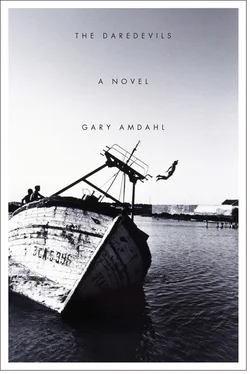She wanted only to leave San Francisco and never return, because to either stay or return would be to confront how little she mattered in the big fraudulent scheme of things as they were apparently playing out. She knew everybody from one end of the investigation to the other, but her associations were not deemed criminal or even of interest, and neither the team of prosecutors nor the team of defense lawyers had required her testimony. The only way such exclusion made sense was to see that the trials had their own special trajectories already plotted out, as if by artillery engineers, and these flights were taking place in their own special place, in their own special space and time, ironically free of the laws of space and time, in a kind of air-that-was-not-air, air so rarefied it was often — in effect, in a subtly theatrical effect that only occurred to the players and the observers deep in the backs of their minds and only when they were thinking unguardedly — nearly impossible to breathe.
She could not keep her mind, her “mind” as she increasingly thought of it, a thing that could not be explained with words — or did she mean to put quote marks around “her,” as if that were the thing that could not be explained, owner and proprietor of an organ of meat, of pudding, designed to carry traces of suffering and horror balanced by traces of peace and pleasure, simply so that it could go on even if she could not — she could not keep away from vivid recreations in her brain of the theater bombing, the understudy who had died in her place — someone who had died for her because she was not available — the parade bombing and the murder of three of her friends and the framing of at least three others, and so she had decided she wanted to die. Understudy be damned: it was her job to die.
But in the end she had been persuaded to go to the Wobblies in Chicago, hearing the repeated advice from friends who seemed so far away, and then so near, and then so far again, and coming to think that she ought to work again, slowly and steadily at something deemed to be of use by somebody who claimed to know, willing to do anything, but making clear a preference, without resort to emotional violence, for activity that would not result in bloodshed. The unhappiness of railroad people, short of bloodshed, would be an ideal goal, she said — any railroad and any people associated with any railroad — as they were convinced beyond a shadow of a doubt that URR, that thugs in the employ of Durwood Keogh or Keogh’s security chief, the marble-like mercenary Rudy Swanson, had not only helped frame Warren Farnsworth and Tom Moody for the murders and the bombings, but actually killed Jules Beveridge, Amado Fernández, and Lucille Brown, for no readily recognizable reason. It was possible too that they had organized and staged the bombing, rather than simply availing themselves of it. The Chicago Wobblies believed that worse things were happening, or were about to happen, in Minnesota, the flour capital of the universe, than anyplace else that came readily to mind, but Jules Beveridge, no more than a month before he was murdered, had met his old friend from Philadelphia days and the Point Breeze board track, a Swedish engineer, Stringberry, who was developing a new motorcycle with a Chicago businessman named Tom Peacock, and these men had unqualifiedly endorsed her. Why? Charles wanted simultaneously to know and not know. The possibility of decisive, consequential action seemed greater the greater the knowledge the actor possessed — until the actor thought about it a little longer and came to the conclusion that less knowledge made for purer acts. Greater knowledge could easily become a burden, an increasing weight that would slow and eventually stop an actor in his tracks. But purity.! Ruthlessness and horror surely rose up in the shadow of purity, did they not? Charles could see Father so clearly, eating breakfast, saying just that.
But there was a kind of purity in Vera, something like purity, that partook nothing at all of ruthlessness, of certainty, hatred, violence. There was in fact something in Vera’s character as Charles had observed it — and that was an extremely rigorous distinction he was well aware of — that dismissed those elements entirely from sullied political ideas of purity — in fact purified it. He could, alas, only see its shape. Its nature was obscure.
From Saint Paul, Charles had written to her in Chicago at least once a week. They were not exactly love letters, but contained evidence of what she was prepared to accept as a kind of energetic devotion to her well-being. It was foolish, she told herself, to pretend she didn’t care for this devotion. And she wondered too where the harm was, given that her days and the days of everybody she cared about were numbered, if she were not at least a little in love with Charles Minot, the millionaire playboy? She had wanted to kill herself in San Francisco, and what she was doing in Chicago did seem very much to be only the work the men didn’t want to do, work the men thought women therefore ought to do.
The next week it began to snow. Vera, who was living in a room in a house, at 130 Virginia street, that Charles had found for her near the Saint Paul Cathedral and Father’s cousin’s castle-like structure on Summit Avenue, cried out with delight and fond memories, while he, though he had seen snow, a good deal of it, in the mountains, was fascinated as only a boy from San Francisco could be. But it didn’t stop snowing until the new year had come. The average was nearly a foot a week. On a Thursday or a Friday or a Saturday — always, it seemed, at the end of a week — a blizzard would come howling down from Alberta, they were told, Alberta clippers, drop a foot of powdery dry snow, and depart for Chicago. The winds piled up immense drifts, and the below-zero air that followed like a swelling sea the crashing waves of the storm, froze the drifts solid as iron. People walked on them to the tops of their houses. To the west, on the Dakota borders, herds of cattle, sheltering in coulees, were buried alive. A train, too, was buried, near Minot, though no one died. Warren Farnsworth was tried and found guilty of the murders of Lucille Olivet Brown, Jules Beveridge, and Amado Joaquin Fernández de Lizardi — these in addition to the ten people killed in the Preparedness Day Parade bombing and the six in the theater bombing. He was sentenced to hang for the former, and life imprisonment for the latter — the idea being that he was a pipsqueak of a boy (he was twenty-two but looked sixteen) and a natural rat (he only, unfortunately, looked like one) who would likely tell investigators a great deal more about his anarchist and labor radical masters once he was in prison with certain death approaching. Tom Moody was found guilty, largely on the strength of the ball bearings and.31- and.32-caliber bullets found in his apartment — items similar but not identical to the shrapnel in both suitcase bombs — of masterminding the bombing and was sentenced to hang. His wife, Minnie, and Israel Minkowski were acquitted — largely, it was believed, because the public’s distaste for what was increasingly seen as shoddy prosecution was rising like bile in the back of the throat. A threatened indictment of Alexander Berkman, the most well known of the more than twenty suspects in the theater bombing, never materialized, never for any of them, for possibly the same reason. A great deal of perjury was reported in the newspapers, but nothing came of it. Meanwhile, in Saint Louis, Missouri, in the thriving Mexican expatriate community there, Amado’s brother, Julio, was found bound and gagged with a bullet hole drilled through his brain, and Vera began to wonder if it was the Fernández de Lizardi brothers who had been the killer’s targets; that Lucy had been killed out of obvious necessity, being in bed with Amado, Beveridge surprising the killer as the killer made his way up from the basement and Beveridge down to find his lover with his friend; and that the killer was not in any way connected with PG&E or URR detectives, but was a mercenary, perhaps associated with the Pinkertons — who certainly, according to the Chicago Wobblies, felt they had carte blanche from the Mexican-hating Wilson administration to act covertly, preemptively, and outside the law — in the employ of the psychotically unstable Mexican government of Huerta. And indeed, once the two brothers in exile had been assassinated, the third, in a Mexico City prison, was promptly executed. Then there was another big bombing, on Wall Street in New York. Italian anarchists were blamed, thirty people died, and it was only a prelude.
Читать дальше












